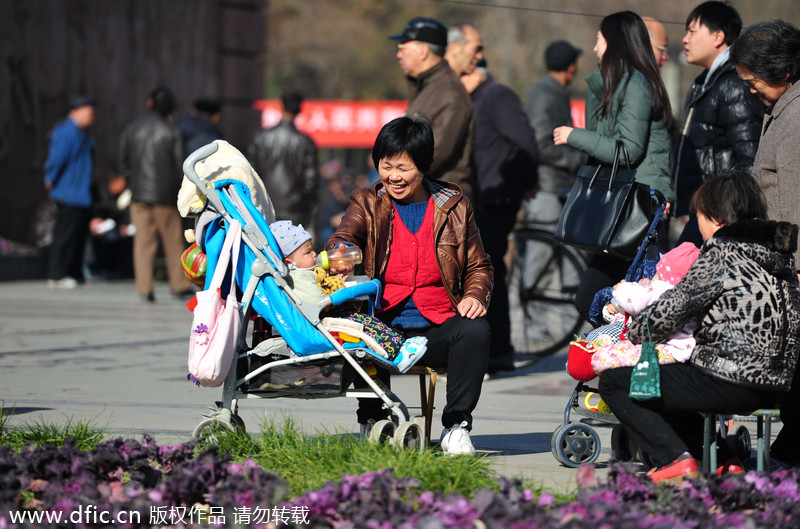
Li Xiufen, a 57-year-old from China's northeastern region, left her village home and headed to stay with her son's family in a high-rise apartment in Xianghe, Hebei province, neighboring Beijing.
She moved into her son's home with the hope of lending a hand with her grandson, whose parents can't look after him in the daytime.
However, the joy of being with her grandson soon abated as Li found herself engulfed with immense loneliness and uneasiness in living a city life.
"I have five big, bright rooms in my own house in my hometown, and I can lie on any of the kangs (a brick bed that can be heated from below) as I wish. Besides, the cucumbers and beans I grew in the courtyard, as well as the quacking ducks and clucking chickens, could be enough to serve the dinner table," Li said.
"But now I have to buy vegetables that are very expensive. Also, I had absolutely no idea what a QR code is and was completely at a loss when a shopkeeper asked me to scan one," the grandmother recalled.
At the same time, the old woman was ashamed of her heavy accent, which dented her confidence in chatting with her neighbors. Moreover, her relations with her daughter-in-law are sometimes problematic.
Being accustomed to a more frugal life, Li can't bear the sight of wasteful behaviors. Every time her daughter-in-law tries to throw something out, she stops her. One day her daughter-in-law smuggled some unwanted belongings out to the garbage bin, thinking she would escape her mother-in-law's notice, but Li dashed out and retrieved the items she had tossed.
Yet the most critical source of conflict between her and her daughter-in-law relates to their different approaches to child-rearing.
When her grandson knocked into a desk corner, Li hit the desk and shouted, "Bad desk, how dare you trip my grandson!"
However, when his mother argued that such indulgence could mislead the child, who needs to establish fundamental judgment between right and wrong, the grandmother protested, "I raised your husband in the same way."
Li was not always so aggressive. "In reality, we are here to help, not to make trouble," Li confessed. "But it is hard to withstand blame after so many times," she added.
Over the past few years, China has witnessed a growing number of seniors like Li leaving their rural homes, sacrificing their own health and facing the inconvenience of seeking out medical services in different regional systems, in order to help their sons or daughters take care of their children.
To facilitate these grandparents to live a better life, cities like Guangzhou, the capital of Guangdong province, are joining hands with other regions to enable elderly patients to reimburse their healthcare costs directly where incurred, as long as they have filed for cross-regional settlements among different medical systems.
Additionally, to better serve senior citizens, people in some communities are trying to attract grandparents to attend various spare-time activities.
Although Li said she is unable to watch her favorite musical-dance duet in Xianghe, she has now discovered a new passion for yangge, a popular rural folk dance featured at regular events for elders in her new community.
Every day, when the young couple comes home to relieve her from her childcare duties, Li dashes downstairs to join the dance group. The activity has enabled her to integrate more fully into the community, she said.
